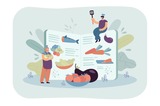
In this activity, students will practice describing different recipes and listing ingredients.
- Subject:
- Languages
- Material Type:
- Activity/Lab
- Author:
- Blake Simmerman
- Amber Hoye
- Camille Daw
- Mimi Fahnstrom
- Brenna McNeil
- Date Added:
- 12/04/2020

In this activity, students will practice describing different recipes and listing ingredients.

This course is an intensive introduction to architectural design tools and process, and is taught through a series of short exercises. The conceptual basis of each exercise is in the interrogation of the geometric principles that lie at the core of each skill. Skills covered in this course range from techniques of hand drafting, to generation of 3D computer models, physical model-building, sketching, and diagramming. Weekly lectures and pin-ups address the conventions associated with modes of architectural representation and their capacity to convey ideas. This course is tailored and offered only to first-year M.Arch students.

Students learn about common geometry tools and then learn to use protractors (and Miras, if available) to create and measure angles and reflections. The lesson begins with a recap of the history and modern-day use of protractors, compasses and mirrors. After seeing some class practice problems and completing a set of worksheet-prompted problems, students share their methods and work. Through the lesson, students gain an awareness of the pervasive use of angles, and these tools, for design purposes related to engineering and everyday uses. This lesson prepares students to conduct the associated activity in which they “solve the holes” for hole-in-one multiple-banked angle solutions, make their own one-hole mini-golf courses with their own geometry-based problems and solutions, and then compare their “on paper” solutions to real-world results.

Ever wondered how comics are made? How about how to draw your own? In this video, Thien Pham, a graphic artist from Oakland, CA, will show you step-by-step how to create your own comic, from writing the plot to drawing the four-panel itself.

Follow along as artist Sirron Norris demonstrates how to draw various emotions on cartoon faces. See how subtle changes make a big difference when expressing emotion through art.
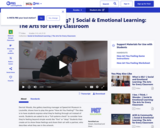
Derrick Woods, the gallery teaching manager at Speed Art Museum in Louisville, shows how to play the game “How Art You Feeling?” The idea is to have students express what they’re feeling through art instead of words. Students are asked to do a “full systems check” to consider how they’re feeling beyond simple words like “fine” or “okay.” Students then create art to show these feelings and share their art with a partner, who describes what they see in the artwork.
The game encourages students be thoughtful about expressing their feelings. It also helps them learn to consider their partner’s feelings. In the video, the two young women who are game partners discuss the feelings they were trying to express and find common elements in their drawings. The activity helps students develop social awareness and relationship skills.

This is a mini lesson for students to learn how to draw a star by using the letter A. The lesson includes a graphic of the tutorial and a video. This would be a perfect activity for early finishers and for a substitute day.
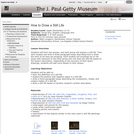
Students will form two groups, and each group will analyze a still life. Then each student will write a three-paragraph essay describing how to draw the work of art they are studying. Each student will exchange his or her essay with someone in the other group who will draw the still life based on the essay's description. Depending on the accuracy of their peers' drawings, students will add more details to their essays.

Students will learn about the work of illustrator Elizabeth Zunon. Zunon calls herself “a global artist" because she grew up in Ivory Coast, West Africa, and would spend summers in Albany, New York, with her American grandparents. She loved reading and drawing and decided to combine her two passions to tell stories for children. Today, Elizabeth is a successful children's book illustrator and author. In the related activity, students will work with drawing, painting, and collage to create an illustration of their own. The video and discussion will take one class session. The art activity may take several class sessions.
More About This Resource
For more studio tours and other arts content from WMHT, visit AHA! A House for Arts. AHA! A House for Arts features the stories of artists, makers, and creative institutions right here in our backyard and across the country. A celebration of all things creative, AHA! features everything from the traditional to the innovative.

This course provides a foundation to the design of the environment from the scale of the object, to the building to the larger territory. The design disciplines of architecture as well as urbanism and landscape are examined in context of the larger influence of the arts and sciences. Students are expected to develop skills in thinking and analysis, spatial representation, and design methodologies. Through lectures and design exercises, students are provided an opportunity to establish a reference for understanding the discipline of architecture and environmental design, and are given an introduction to design fundamentals and the design process.

During this course, we will be exploring basic questions of architecture through several short design exercises. Working with many different media, students will discover the interrelationship of architecture and its related disciplines, such as structures, sustainability, architectural history and the visual arts. Each problem will focus on one of these disciplines and one exploration and presentation technique.

This is a lesson plan for introductory science in the preschool classroom. Its an activity about the sun and the sun's effects on the earth. It includes a song, lecture, story time, poster creation, and student presentation.

Examine the skills and materials needed by Jan Heath in order to use woodcuts to create prints.
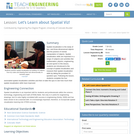
Spatial visualization is the study of two- and three-dimensional objects and the practice of mental manipulation of objects. Spatial visualization skills are important in a range of subjects and activities like mathematics, physics, engineering, art and sports! In this lesson, students are introduced to the concept of spatial visualization and measure their spatial visualization skills by taking the provided 12-question quiz. Following the lesson, students complete the four associated spatial visualization activities and then re-take the quiz to see how much their spatial visualization skills have improved.
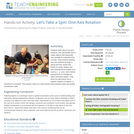
Students learn about one-axis rotations, and specifically how to rotate objects both physically and mentally to understand the concept. They practice drawing one-axis rotations through a group exercise using cube blocks to create shapes and then drawing those shapes from various x-, y- and z-axis rotation perspectives on triangle-dot paper (isometric paper). They learn the right-hand rule to explore rotations of objects. A worksheet is provided. This activity is part of a multi-activity series towards improving spatial visualization skills.

San Francisco artist and author Jessica Hische has designed everything from chocolate lettering to Wes Anderson movie title sequences. Here she takes us into her design studio with a demo on custom lettering from pencil sketch to vector paths.
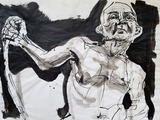
OER Textbook for life drawing by Mahara T. Sinclaie from Pasadena City College.Emphasizes gesture and planar analysis with attention to composition. Includes color theory.Provides rubric and supply list.

About the Arts, Care & Connection Lesson Collection: Arts for Learning Northwest collaborated with Oregon teaching artists on this collection of arts integration modules designed for K-5 students, with integrated social emotional learning content in the areas of dance, visual arts, theater, and music.

About the Arts, Care & Connection Lesson Collection: Arts for Learning Northwest collaborated with Oregon teaching artists on this collection of arts integration modules designed for K-5 students, with integrated social emotional learning content in the areas of dance, visual arts, theater, and music.

"Nature furnished the materials for architectural motifs." This quote from Frank Lloyd Wright illustrates his desire to connect humans to the natural landscape through architecture. One successful example of this concept was his design of art glass windows that connected with the trees and leaves outside. Examine the beautiful window patterns Frank Lloyd Wright designed for the Martin House and then design your own Wright-style window inspired by nature.
More than a biography of America’s greatest architect, Frank Lloyd Wright's Buffalo is a story of family, friendship and the meaning of home in American life. The program explores how a friendship spanning decades affected the structural aesthetic of a major American city and made a significant impact on architectural history. Buffalo, New York has the unique privilege of having more Frank Lloyd Wright structures than any other city in America outside of Chicago. This collection of architecture is due to one man: Buffalo businessman Darwin D. Martin. The centerpiece of Wright’s work in Buffalo is one of Wright's earliest designs, the Darwin Martin House. Built in 1904, it precedes such masterpieces as the Robie House and Fallingwater and is considered by many as the finest example of his prairie house design. Learn more about the WNED PBS original production here.